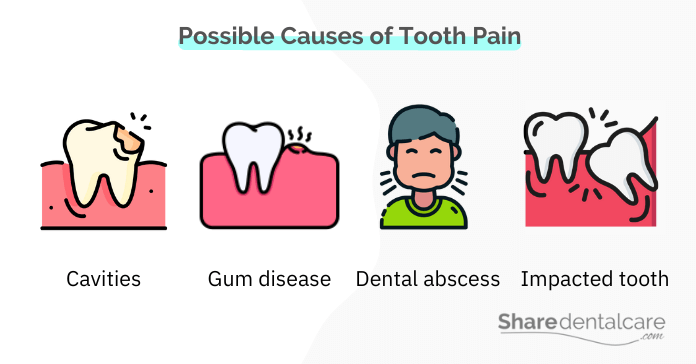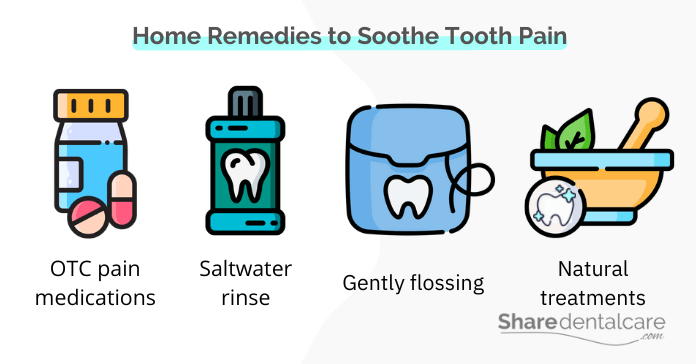Tooth pain is one of the most common reasons people visit the dentist. It can be caused by several problems, such as cavities and gum disease. If you are experiencing tooth pain, it is important to seek dental care as soon as possible. If left untreated, tooth pain can become more severe, and the underlying cause can lead to more serious health complications. In this blog post, We will discuss some home remedies to soothe tooth pain while waiting to see your dentist.
What Are The Possible Causes of Tooth Pain?
Tooth pain can be caused by cavities, gum disease, infection, and even grinding your teeth. Depending on the cause, you may experience different types of pain. Toothache pain can be sharp and sudden or dull and throbbing.
- Cavities: They can cause sudden, sharp pain when exposed to hot or cold temperatures.
- Gum Disease: This can cause a dull ache that tends to come and go throughout the day.
- Dental abscess: A severe toothache can be a sign of infection in the gums or roots of the tooth. This type of pain is usually constant and throbbing.
- Teeth Grinding: If you grind your teeth at night, it can cause a sharp pain in your jaw.
- Broken tooth filling: If a filling is loose or missing, it can cause sensitivity and pain when you bite down.
- Tooth fracture: If your tooth is cracked, it can cause sharp and sudden pain when exposed to cold or hot temperatures.
- Impacted wisdom teeth: Impaction can cause pressure and pain in the gums and jaw. The operculum is a gum tissue flap that covers a partially erupted or impacted wisdom tooth. This operculum can become inflamed (pericoronitis), causing pain.
Home remedies can help soothe tooth pain, however, they can’t treat the underlying cause. If you are experiencing pain, it is important to visit a dentist so they can diagnose and treat the problem appropriately.

Home Remedies to Soothe Your Tooth Pain
While waiting to see your dentist, try one of these home remedies to help soothe your tooth pain. These home remedies can provide temporary relief from your toothache.
- Over-the-counter pain medications: If your pain is severe, you may wish to take over-the-counter pain relievers such as ibuprofen or acetaminophen. Consult your doctor before taking any medication.
- Saltwater rinse: Rinsing your mouth with warm salt water can help reduce inflammation and swelling and temporarily relieve pain. Mix one teaspoon of salt with one cup of warm water and rinse for about 30 seconds.
- Gently flossing: This can help remove any food particles that may be lodged between your teeth.
- Hydrogen peroxide rinse: Hydrogen peroxide can help kill bacteria and reduce inflammation. Swish a mixture of equal parts hydrogen peroxide and water around your mouth for about 30 seconds, then spit it out. Be careful not to swallow it.
- Ice pack: Applying an ice pack to the affected area can help reduce swelling and provide temporary relief from pain. Wrap an ice pack in a towel and place it on your cheek or jaw for a few minutes.
Natural Treatments to Soothe Tooth Pain
- Clove oil: Clove oil contains an active ingredient called eugenol, which has been used for centuries to soothe tooth pain. Rub a few drops of clove oil on the affected area or apply it directly to the tooth with a cotton swab.
- Peppermint tea: Peppermint contains menthol, which has anti-inflammatory and numbing properties. Steep one peppermint tea bag in hot water for 10 minutes, then let the tea cool down before rinsing your mouth with it.
- Garlic: Garlic contains antiviral and antibacterial properties that can help reduce inflammation and pain. Simply mash a garlic clove with some salt and apply it directly to the affected tooth.
Although these home remedies may provide temporary relief, seeing a dentist as soon as possible is important. A dentist can diagnose the underlying cause of your tooth pain and provide treatment to help prevent it from getting worse.

Can Toothache Cause Complications?
Tooth pain itself is not a serious medical condition, but rather a symptom of a dental problem, such as tooth decay or gum disease. If left untreated, the infection can spread to other areas of the mouth and body. This can lead to more severe complications such as:
- Dental abscess: Tooth decay bacteria can spread to the tooth nerve, causing an abscess.
- Facial swelling: If the infection spreads, it can lead to swelling in the face and cheeks.
- Ludwig’s angina: This is a severe condition where the infection spreads to the floor of the mouth and throat.
- Sepsis: In rare cases, the infection can spread to other parts of the body and cause a life-threatening condition known as sepsis.
It is important to visit your dentist if you are experiencing tooth pain, as they can provide the appropriate treatment. A prompt diagnosis and treatment can help reduce the risk of any further complications.
How Will The Dentist Soothe My Tooth Pain?
Your dentist will be able to diagnose the cause of your tooth pain, soothe it, and recommend an appropriate treatment. Depending on the underlying cause, they may:
- Tooth filling: If the cavity is causing your toothache, they may suggest a filling to repair it.
- Root canal: This procedure is used to remove any infected tissue from within the tooth.
- Antibiotic: If an infection is causing the pain, your dentist may prescribe antibiotics to help clear it up.
- Extraction: In some cases, if your tooth is severely damaged, infected, or impacted, it may need to be removed.
- Nightguard: If you are grinding your teeth at night, a custom-fitted nightguard can help soothe tooth pain and protect your teeth from further damage.
Prevention Tips to Avoid Dental Problems & Pain
To help reduce the risk of developing tooth pain and other dental problems, you can:
- Brush and floss regularly: Brush your teeth twice a day for two minutes each time and clean between the teeth with floss or an interdental cleaner.
- Visit your dentist for regular checkups: It is recommended to see a dentist at least once every six months for a routine checkup.
- Avoid sugary and acidic foods: Eating sugary and acidic foods increase the risk of tooth decay.
- Quit smoking: Smoking can lead to several dental problems, so quitting is one of the best ways to look after your teeth.
- Wear a mouthguard: If you play contact sports, wearing a mouthguard can help protect your teeth and gums from any potential injuries.
Soothe Tooth Pain – Conclusion
Tooth pain can be a sign of an underlying problem, so it is important to visit a dentist as soon as possible. While waiting to see your dentist, you can try several home remedies and natural treatments to soothe your tooth pain, such as salt-water rinse, garlic, and clove oil. However, these methods should only be used to provide temporary relief and should not replace professional treatment. Taking good care of your teeth and regularly visiting your dentist can help reduce the risk of tooth pain and other dental problems.